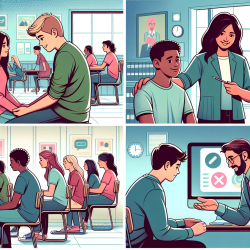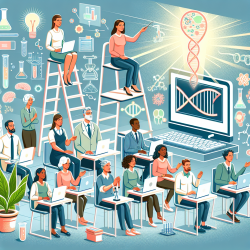Unlocking Infant Brain Development: Insights from fNIRS Research
At TinyEYE, we are passionate about leveraging cutting-edge research to enhance the outcomes of our online therapy services for schools. A recent study titled Open access dataset of task-free hemodynamic activity in 4-month-old infants during sleep using fNIRS provides groundbreaking insights into the functional organization of the infant brain. This blog explores how practitioners can implement these findings to improve their skills and encourage further research.
Understanding the Research
The study conducted by Blanco et al. (2022) utilized functional near-infrared spectroscopy (fNIRS) to measure spontaneous hemodynamic activity in 4-month-old infants during natural sleep. The primary objectives were to characterize the intrinsic functional organization of the infant brain and investigate whether bilingualism could lead to adaptations in functional brain network development at this early age.
Key Findings
The study revealed several critical findings:
- Functional Connectivity: The research identified large-scale functional connectivity patterns in the infant brain, demonstrating how different brain regions communicate during rest.
- Impact of Bilingualism: Infants exposed to two languages from birth exhibited distinct functional brain network adaptations compared to monolingual infants. This finding suggests that early bilingual exposure can influence brain development.
- High-Quality Data: The study emphasized the importance of acquiring high-quality data to ensure reproducible results. The researchers used a large sample size (n=104) and long recording durations to achieve this goal.
Practical Applications for Practitioners
As a practitioner, you can leverage these findings to enhance your skills and improve outcomes for the children you work with:
1. Emphasize Early Language Exposure
The study highlights the benefits of early bilingual exposure on brain development. Encourage parents to introduce multiple languages to their infants from birth. This can lead to improved cognitive flexibility and better functional brain network development.
2. Utilize fNIRS Technology
Functional near-infrared spectroscopy (fNIRS) is a non-invasive, noiseless neuroimaging technique that measures hemodynamic activity in the brain. Consider incorporating fNIRS into your practice to gain insights into the functional organization of the brain in infants and young children.
3. Focus on Data Quality
High-quality data is crucial for making informed decisions. Ensure that your data collection methods are robust and minimize potential artifacts. This will help you obtain reliable and reproducible results.
4. Encourage Further Research
The findings from this study provide a valuable resource for further research. Collaborate with other researchers and institutions to explore new avenues of investigation. This can lead to a deeper understanding of infant brain development and inform best practices in speech-language pathology.
Conclusion
The research by Blanco et al. (2022) offers valuable insights into the functional organization of the infant brain and the impact of bilingualism on brain development. By implementing these findings, practitioners can enhance their skills and improve outcomes for the children they work with. To read the original research paper, please follow this link: Open access dataset of task-free hemodynamic activity in 4-month-old infants during sleep using fNIRS.










